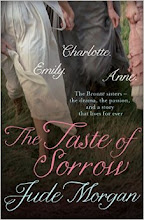Having come to Iris Murdoch two years ago, I have become convinced that she truly is, as so many critics argue, one of the greatest British writers of all time. I can still feel Christmas morning 2008, when I woke in my mother's house, padded downstairs to fetch a coffee and a warm mince pie, then returned to my bed and curled up under my duvet to resume The Sea, The Sea where I had unwillingly left it the night before, about halfway through. It was Christmas morning, for heavens sake - I heard the rest of the family stir and one by one go downstairs. Bits of broken conversation, laughter and smells of cooking mingled and drifted up to my room, but I ignored them and stayed with Murdoch. I simply couldn't put the book down, and only finally, reluctantly, even sulkily, did so when my mother came and knocked on my door to tell me that everyone was waiting for me so that we could open the presents. The Sea, The Sea remains one of my favourite books.
And so I have come at last to The Bell, one of the most popular of Murdoch's psychological studies of human behaviour. Here we find a group of social misfits - though largely, it must be said, no more 'misfitting' than any of us - holed up in a religious community awaiting the arrival of a new bell at the Abbey nearby. The opening sets the score, and is one of Murdoch's most brilliant:
"Dora Greenfield left her husband because she was afraid of him. She decided six months later to return to him for the same reason."
Thus, are characters drawn with such a deft pen. And it is the characters who matter in Murdoch's novels. Ordinary situations are made extraordinary by the doings of ordinary people - momentary lapses of sanity, bad decision making and misreading of others motives create, for the characters in Murdoch's world, outlandish situations. In The Bell, I think I audibly groaned when Dora hatches her plan for the medieval bell that Toby has found at the bottom of the lake. I just wanted to shake her - don't be so stupid, surely you can see that this is going to go horribly wrong...? But of course, she goes ahead with it anyway, and of course, it all goes horribly wrong.
I love the way Dora's personality is cleverly revealed through her lack of belief in her own decisions. Frequently, she decides she will refuse to do something, and the next paragraph begins with her doing just that thing. Likewise, we are told early on that Toby has recently discovered and enjoyed the word 'rebarbative', and the word turns up regularly when Toby is the central character. Such simple techniques, so cleverly handled, are what raises Murdoch above her peers.
What really makes Murdoch stand out, though, is, of course, her brilliant understanding and encapsulation of the deep psychological motives, often unknown to ourselves, that govern our movements. A character - here, Michael, for example - may examine himself thoroughly, and believe that he has read a situation accurately, only to discover later that in fact he never had any idea what others were thinking or feeling and he has misjudged the whole scenario fatally.
Despite the academic depths of Murdoch's books, I am always surprised by how overtly readable they are. The Bell is funny, cringeworthy, pacey in its latter half (my only criticism would be that it takes a little while to really get going), intriguing, warm, and, at the end of the day, simply tells a good story.
For me, The Sea, The Sea is still Murdoch's best, but I have many more to go, having read only four so far, and The Bell, being comparatively short, is a pretty good place to start if you are unsure as to whether or not Murdoch is for you.
Sunday, 28 November 2010
Subscribe to:
Post Comments (Atom)


3 comments:
I was so interested to read your comments on character and readability, epsecially just one day after reading an old interview of Iris Murdoch herself. I think you might enjoy it as well, and it can be found here:
http://www.theparisreview.org/interviews/2313/the-art-of-fiction-no-117-iris-murdoch
I particularly like her comment that "literature is to be enjoyed, to be grasped by enjoyment." It is really appalling that I've yet to read any of her work. Must add some to my must read pile!
Best Wishes and Happy Reading!
You describe that so well, your Christmas morning 2008, totally brilliant, loved it - it could so easily have come from a book I'd write! I'm ashamed to say I've haven't read any of Iris' books, but you talk so passionately about her I think i should. I have only just started reading Sylvia Plath, and wondered what took me so long to do that as well! I'm going for The Sea, The Sea, Karen.
Just finished reading The Bell for the third time. I'm going through her whole fiction canon in order (again).
Post a Comment